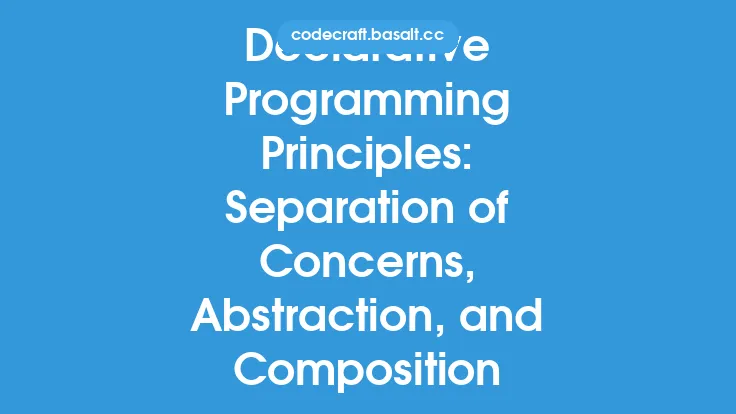Functional composition is a fundamental concept in functional programming that enables developers to build modular and reusable code. It involves breaking down complex functions into smaller, independent functions that can be composed together to achieve a specific goal. This approach allows for greater flexibility, maintainability, and scalability in software development.
Introduction to Functional Composition
Functional composition is based on the idea of treating functions as first-class citizens, which means they can be passed as arguments to other functions, returned as values from functions, and stored in data structures. This allows developers to create higher-order functions that can manipulate and combine other functions to create new ones. The key benefits of functional composition include improved code reusability, reduced coupling, and increased modularity.
The Basics of Functional Composition
In functional composition, functions are typically defined with a single responsibility, making them easier to understand, test, and maintain. These functions can then be combined using various composition techniques, such as function chaining, function currying, or function piping. Function chaining involves passing the output of one function as the input to another function, while function currying involves transforming a function with multiple arguments into a sequence of functions, each taking a single argument. Function piping, on the other hand, involves passing the output of one function as the input to another function, using a pipe operator.
Function Composition Techniques
There are several function composition techniques that developers can use to build modular and reusable code. One popular technique is the use of higher-order functions, which can take other functions as arguments or return functions as output. Another technique is the use of function combinators, which are higher-order functions that combine other functions to create new ones. Examples of function combinators include the `compose` function, which composes two functions together, and the `pipe` function, which pipes the output of one function as the input to another function.
Benefits of Functional Composition
Functional composition offers several benefits, including improved code reusability, reduced coupling, and increased modularity. By breaking down complex functions into smaller, independent functions, developers can create a library of reusable functions that can be combined to achieve a specific goal. This approach also reduces coupling, as each function is designed to work independently, making it easier to modify or replace individual functions without affecting the rest of the codebase. Additionally, functional composition promotes a declarative programming style, which focuses on specifying what the code should accomplish, rather than how it should accomplish it.
Real-World Applications of Functional Composition
Functional composition has numerous real-world applications, including data processing, event handling, and API design. In data processing, functional composition can be used to create pipelines of functions that transform and manipulate data. In event handling, functional composition can be used to create event handlers that are composed of smaller, independent functions. In API design, functional composition can be used to create modular and reusable API endpoints that can be combined to achieve a specific goal.
Best Practices for Functional Composition
To get the most out of functional composition, developers should follow several best practices. First, functions should be designed with a single responsibility, making them easier to understand, test, and maintain. Second, functions should be composed together using a consistent and predictable approach, such as function chaining or function piping. Third, developers should use higher-order functions and function combinators to create new functions and combine existing ones. Finally, developers should test and validate their composed functions to ensure they work correctly and produce the expected output.
Common Pitfalls and Challenges
While functional composition offers several benefits, it also presents some common pitfalls and challenges. One common pitfall is the use of overly complex function compositions, which can make the code harder to understand and maintain. Another challenge is the need to manage function composition errors, which can occur when functions are composed together incorrectly. To overcome these challenges, developers should use debugging tools and techniques, such as function tracing and error logging, to identify and fix composition errors.
Conclusion
Functional composition is a powerful technique for building modular and reusable code. By breaking down complex functions into smaller, independent functions, developers can create a library of reusable functions that can be combined to achieve a specific goal. With its numerous benefits, including improved code reusability, reduced coupling, and increased modularity, functional composition is an essential concept in functional programming. By following best practices and avoiding common pitfalls, developers can harness the power of functional composition to create more maintainable, scalable, and efficient software systems.





